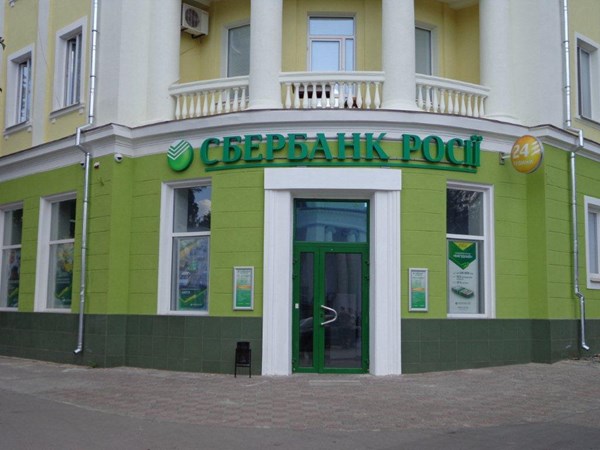Ukraine introduces sanctions against Russian banks
On March 16 Ukrainian President Petro Poroshenko enacted the decision of the National Security and Defense Council (NSDC) of Ukraine to adopt sanctions with respect to a number of legal entities. Ukraine will soon adopt sanctions for a year on five banks with Russian capital: Sberbank, VS Bank, Prominvestbank, VTB Bank, and BM Bank. The goal of the sanctions is to prevent them from withdrawing this capital from Ukraine in favor of entities related to them.
The media outlet 24tv.ua reports that Ukrainians hold 36 billion hryvnia in these banks. The National Bank asserts that ordinary clients will not feel the influence of the sanctions. “The banks are not going anywhere, they will continue to operate in the Ukrainian legislative environment. The sanctions will not influence the dollar exchange rate in Ukraine either. If a bank goes bankrupt, Ukraine with pay to citizens for the bankruptcy of the Russian bank according to current legislation,” said Oleksandr Savchenko, former Deputy Head of the National Bank of Ukraine.
However, Russian “Sberbank” has already delivered a “return blow” on the sanctions. This bank temporarily blocked the credit limit of payment cards belonging to natural persons. The site reports that people can top up credit cards, but cannot make payments or withdraw money on credit.
“Credit cards are currently available for topping up. We will make an additional notice regarding the blocking of card operations,” the financial institution’s site reads.
Russia has already commented on the decision regarding the sanctions. Dmitry Peskov, Press Secretary to the Russian President, said that the Russian government is concerned by the introduction of sanctions against the five banks with Russian state capital.
“In the economic sector Ukraine is ceasing to be a reliable and predictable place for foreign and international interests, where money can be invested, and which can appear as a living economic entity,” Peskov said.
In his opinion, the introduction of sanctions against the Russian financial institutions goes against international law. Peskov also promised that Russia would support and defend the interests of the Russian banks in Ukraine through all available legal means.
Andrey Kostin, CEO of VTB Bank believes that the introduced sanctions will prove to be as negative for the economy of Ukraine as a whole as they are for the banks themselves. He claims that the decision regarding the sanctions was made for political reasons. Kostin admitted that it is becoming harder and harder for Russian banks to operate in Ukraine, and “it’s almost as if the local authorities are forcing them to leave”.
The investment company ICU [Investment Capital Ukraine] believes that such a form of sanctions is more viable for Ukraine than the nationalization or liquidation of these banks.
“The decision to ban capital outflow strikes Russia’s interests as a country-investor. If the banks are nationalized, the expenses for expanding their capital would lie on the Ukrainian budget, because not all of these five banks are completely capitalized. If these banks are closed as a result of recognizing their insolvency, accounts with investors would also have to be compensated for from another state source – the Deposit Guarantee Fund of natural persons,” says the commentary of the analytic subdivision of the ICU.
The ICU has also named the most favorable way for Russian shareholders to get out of the Ukrainian business and regain a part of the funds.
“This is the sale of the subsidiary banks to third party investors. It will be easier to find buyers for the small banks – VS Bank or BM Bank, which do not have as many major debtors or repeat defaulters as the other banks. The small banks could be interesting primarily to investors who want to enter the market and have not only a license, but also a small functioning network of branches. A strategic withdrawal from the market by the major banks could become a squeeze of balances, which are reduced as a result of gradual credit repayment,” the company analysts note.
Ukrainian MP Vadym Denysenko believes that the adoption of the sanctions is completely pointless.
“De facto they [the banks] could not withdraw capital to Russia… both Sberbank and VTB have negative capital, and they have no right to withdraw money. And if they were profitable, another mechanism comes into play here: withdrawing dividends is only possible after a separate decision by the National Bank. Simply put, today’s sanctions are not shutting down Russian banks, they are only a fig leaf covering the fact that the NBU has always protected these banks,” Denysenko stated.
